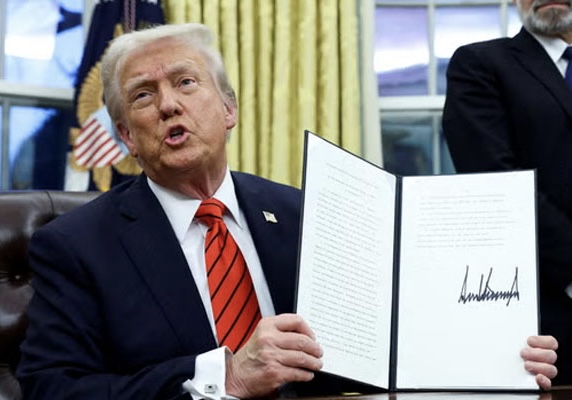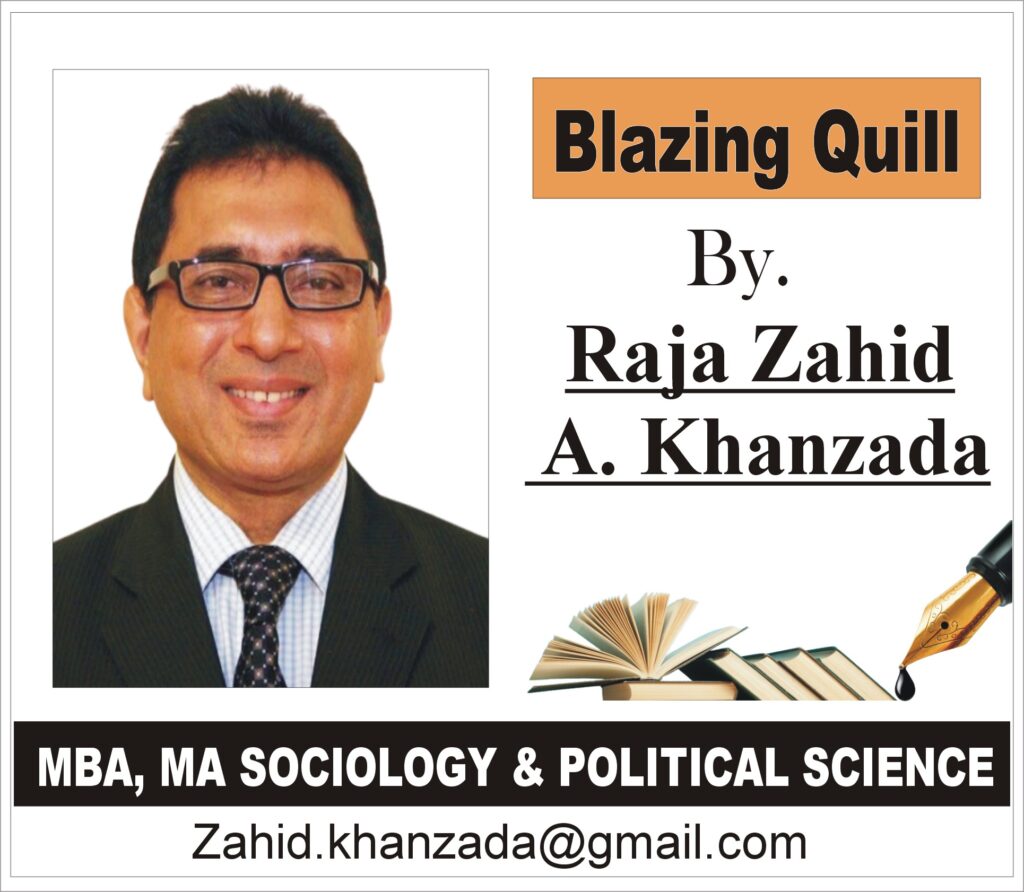A Watchtower of Restrictions on the Land of Dreams, Muslim Immigrants’ Dreams Under Threat from Trump’s Executive Orders
By: Raja Zahid Akhtar Khanzada
In some silent hour of the night, when a student from a Muslim country or Pakistan is sitting in a quiet corner of a U.S. library, lighting the lamp of knowledge for a brighter future, he suddenly finds out that an old social media post perhaps a few months back where he had mourned the destruction of Gaza’s streets, has now become a wall blocking the renewal of his visa.
Or imagine a Green Card holder someone who once lived in a country where freedom of expression was a distant dream now happily living in the U.S., working hard and embracing his newfound liberty. For him, the right to speak and write freely was a gift of this land. But now, upon reading a new Executive Order, it must feel like a bomb has exploded over his world. Simply for using that right, he now faces the looming threat of deportation.
Only those who are living this struggle in the so-called land of dreams can truly understand the pain and fear that grips their hearts.
This is not fiction. This is a reflection of the new reality unfolding in the United States a reality shaped by three Executive Orders issued by President Donald Trump. These orders are not only altering the face of American values but have become the beginning of a new trial for Muslims, students, researchers, and social media activists.
In this new landscape, the pursuit of knowledge once considered a sacred act is now seen with suspicion. The voice of conscience, once cherished as a sacred human call, is now criminalized. And freedom of expression, which once set America apart from the rest of the world, now seems reserved only for those who can stay silent in the face of injustice.
This is not an imaginary tale. It is the lived reality under the shadow of three Executive Orders signed by President Donald Trump:
1. Combating Antisemitism
2. Additional Measures to Combat Antisemitism
3. Protecting the United States from Foreign Terrorists and Other National Security Threats
Executive Order 1: “Combating Antisemitism” — The Price of Silence
Under this order, American universities have been obligated to take strict actions against antisemitism. On the surface, this seems like a positive step against hate. However, the definition of antisemitism has been broadened to the extent that now, criticism of Israel, expressing solidarity with the Palestinian people, or even sharing a picture of a child affected by war is being labeled as “antisemitism.”
If a student raises a voice in support of human rights, it can trigger scrutiny of their immigration status, visa, or academic record. The real question here is not why action is being taken against hate rather, the question is: How did simple dissent become defined as hate?
Executive Order 2: “Additional Measures to Combat Antisemitism” Searching Hearts
Issued in 2025, this second Executive Order is even stricter than the first. It no longer just targets universities it now targets individuals. USCIS (United States Citizenship and Immigration Services) will now determine whether a person’s social media activity falls under the category of antisemitism.
If you even mention the name of an organization designated as a terrorist group by the U.S., such as Hamas, Hezbollah, or the Houthis, your Green Card application may be denied. Even an old retweet, a comment, or silent participation in a protest could change the course of your life.
In fact, a Green Card holder could have their status revoked without the need for a court order. It’s as if… along with your passport, your conscience will now also be interrogated. This is the new reality in today’s America: hearts are searched, posts are punished, and thoughts are monitored.
Executive Order 3: “Protecting the United States from Foreign Terrorists” Protection or Prejudice?
Under this order, individuals from the Middle East, South Asia, and particularly Muslim countries are being viewed through the lens of “potential threat.” Under this order, individuals from the Middle East, South Asia, and particularly from Muslim-majority countries are being viewed as “potential threats.”
Even those who have been living in the U.S. legally for years students, professionals, or green card holders—are now being subjected to intense scrutiny. Their travel history, financial records, affiliations, even distant family ties, can now be interpreted through the lens of national security.
What this essentially means is that a peaceful traveler, a student working on a research paper, or a doctor serving in a hospital can suddenly find themselves in the crosshairs of suspicion simply because of their religion, ethnicity, or country of origin.
This order doesn’t only seek to protect the United States from real threats it opens the door to profiling, fear, and silent discrimination. Under its cover, many Muslim immigrants now live with the unspoken fear that they could be next.
The question is: what exactly is the threat?
Is it that you express sorrow over the massacre of the Palestinian people? Is it that you dare to ask questions?Is it that you refuse to be a silent spectator?
Now, under the label of “Preventive Immigration Control,” it has become possible to deport a student from the U.S. purely on the basis of suspicion.
In America today, the threat is no longer defined by what you do but by what you think.
Although President Trump’s Executive Orders and policies do not explicitly mention the word “Muslim” anywhere, the reality is that most of the young people supporting the Palestinian cause on social media are Muslims. As a result, thousands of Muslim students now feel they are being directly targeted. These legal complications are putting their education and residency at serious risk. According to reliable sources within U.S. government agencies, more than 30,000 Muslim immigrants currently residing in the United States are potentially facing deportation. The Trump administration has reportedly tasked certain agencies with pursuing this goal.
 These policies are not just an immigration issue they represent a full-blown identity crisis for Muslims in America.
These policies are not just an immigration issue they represent a full-blown identity crisis for Muslims in America.
Take, for example, the language used by the state itself—as stated in a USCIS press release: “There is no place in America for those who hate Jews.”
In this way, social media posts have now become more powerful and more dangerous than a passport.
On April 9, 2025, a recent press release issued by USCIS made it explicitly clear:
If you have ever criticized Israel in the past or shown any sign of support for a Palestinian organization, the doors to the United States may now be closed to you.
In this context, the Assistant Secretary for Public Affairs at the Department of Homeland Security (DHS), Tricia McLaughlin, stated in harsh terms during the press release:“Those who seek to promote terrorism or hatred under the guise of free speech need to think again.”
This statement came as USCIS announced that it would be thoroughly investigating the social media accounts of thousands of immigration applicants.
Where once admission to U.S. academic institutions was granted based on academic excellence and intellectual merit, today it is being denied based on social media activity.
It now seems that, like the rulers of many Third World countries, American campuses are beginning to value silence over knowledge. This policy makes it clear that a student’s social media presence is now more important than their academic qualifications, research, or community service.
The result:
International students are suffering in silent agony, caught in a path of uncertainty. Immigrants who hold Green Cards especially those from Pakistan or the broader Muslim world now face a haunting dilemma: Every time they apply to a university or attempt to enter the U.S., they must ask themselves: If I express my opinion, will my visa be canceled? Will my Green Card be turned into a red card?This is not just fear it is a policy designed to strangle consciousness.
A policy in which knowledge is treated as rebellion, and questioning as a crime.
Universities across America are now offering legal advice to students—but even legal experts cannot say for sure which post, comment, or tweet might lead to visa cancellation.
So the questions remain:
Is saying “Free Palestine” now a crime? Is sharing a photo of a martyred Palestinian child an act of terrorism? Is asking questions now considered hostility?
America, once the flag-bearer of freedom of expression, diversity, and academic inquiry, now appears to be violating the very principles it once championed. There is deep concern within the Muslim community living in the United States. Despite the fact that Muslims voted for Trump in large numbers this time, the question remains why is this still happening? At present,human rights organizations are protesting vehemently. But the real question is:
Is education now only for the wealthy? Is it now a right only for the silent? Is there anyone listening to this outcry?
Is education now reserved only for those who say nothing? Will America now accept only those who choose silence in the face of injustice? Or perhaps, one day, this very silence will put America itself on trial?
Knowledge, questioning, and expression once the identity of America have now become crimes and threats, especially for those with a Muslim identity.
This is not the story of just one or two students. This is the reflection of a new policy where silence is rewarded, and truth is punished. As one Palestinian-origin student said:“This country taught me how to learn, how to think… but now that very thinking has become my greatest enemy.” Why?
These new executive orders under the Trump administration have turned America into a testing ground for Muslims where the price of dreams is the sacrifice of freedom of expression, and the cost of identity is the bargain of silence.
Now, if a student dreams of coming to America, they must not only bring knowledge but also the skill of silence.
Because now, only those are safe here who say nothing, write nothing, and speak nothing against injustice.
ہزاروں ظلم ہوں مظلوم پر تو چپ رہے دنیا
اگر مظلوم کچھ بولے تو دہشت گرد کہتی ہے
When the world stays silent despite a thousand atrocities upon the oppressed,
But the moment the oppressed speak, the world calls them terrorists.




